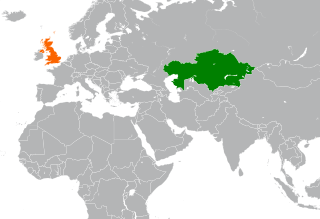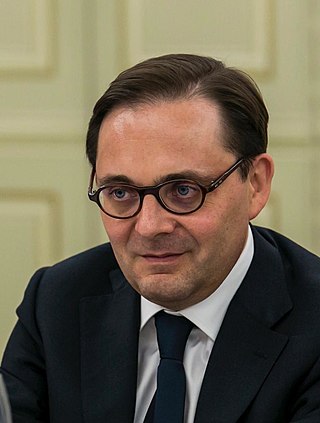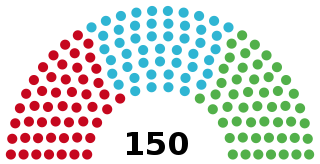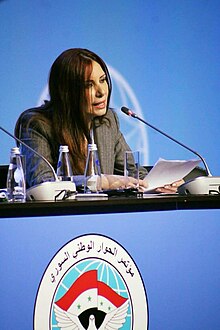
Kazakhstan's approach to foreign relations is multifaceted and strategic, reflecting the country's unique geopolitical position, historical context, and economic ambitions. At the heart of its international diplomacy is a multivector foreign policy, which aims to maintain balanced and diverse relations with all major global powers and regional neighbours. Kazakhstan is a member of the United Nations, Collective Security Treaty Organization, Organization for Security and Co-operation in Europe, North Atlantic Cooperation Council, Commonwealth of Independent States, the Shanghai Cooperation Organisation, and NATO's Partnership for Peace program. Kazakhstan established a customs union with Russia and Belarus which eventually became the Eurasian Economic Union. President Nazarbayev has prioritized economic diplomacy into Kazakhstan's foreign policy.

Kassym-Jomart Kemeluly Tokayev is a Kazakh politician and diplomat who has served as the President of Kazakhstan since March 20, 2019.

Adilbek Ryskeldiuly Zhaqsybekov is current Head of the Executive Office of the President of the Republic of Kazakhstan. He served as the minister of defence from June 2009 to April 2014. He was the head of Kazakh President Nursultan Nazarbayev's administration in 2004-2008 and 2016-2018. He served as the mayor of Astana from 1997 to 2003 and from 2014 to 2016. Chairman of Governors of the Islamic Development Bank in 2003, and the Minister of Industry and Trade from 2003 to 2004.

Erlan Abilfayizuly Idrissov is a Kazakh politician who served as Foreign Minister of Kazakhstan from 1999 to 2002 and from 2012 to 2016.

Kazakhstan – United Kingdom relations were formally established on 19 January 1992. The UK opened an embassy in Kazakhstan in October 1992 and Kazakhstan opened an embassy in the UK in February 1996. Kazakhstan's relations with the West have greatly improved in the last few years as the Government has closely cooperated in the U.S.-led War on Terror.

The Syrian opposition, also known as the Syrian revolutionaries, is an umbrella term for the rebel groups that opposed the Assad regime in Syria. In July 2011, at the beginning of the Syrian civil war, defectors from the Syrian Armed Forces formed the Free Syrian Army. In August 2011, political groups operating from abroad formed a coalition called the Syrian National Council. A broader organization, the Syrian National Coalition (SNC), was formed in November 2012. In turn, the Coalition formed the Syrian Interim Government (SIG) which operated first as a government-in-exile and, from 2015, in certain zones of Syria. From 2016, the SIG was present in Turkish-occupied zones while the SNC operated from Istanbul. In 2017, the Islamist group Tahrir al-Sham (HTS), unaffiliated to the SNC, formed the Syrian Salvation Government (SSG) in the areas it controlled. Rebel armed forces during the civil war have included the Turkish-backed Syrian National Army, affiliated to the SIG, the Syrian Liberation Front, the National Front for Liberation, the Southern Operations Room and the Revolutionary Commando Army. Other groups that challenged Bashar al-Assad's rule during the civil war were the Autonomous Administration of North and East Syria, and the jihadist organization known as the Islamic State.
The Syrian peace process is the ensemble of initiatives and plans to resolve the Syrian civil war, which began in 2011 and spilled beyond its borders. The peace process was moderated by the Arab League, the UN Special Envoy on Syria, Russia and Western powers. The negotiating parties were representatives of the Syrian Ba'athist government and Syrian opposition. The Autonomous Administration of North and East Syria was excluded at the insistence of Turkey. Radical Salafist forces including the Islamic State of Iraq and the Levant have not engaged in any contacts on peaceful resolution to the conflict.

Randa Kassis is a Franco-Syrian politician, a secular figure against Bashar Al Assad, and the president of the Movement for a pluralistic society, which she founded in 2012 after being excluded from the Syrian National Council. She also served as the President of the Astana Platform. Her groups' stated aim was to achieve a political transition in Syria, involving the regime of Bashar Al Assad, similar to the objectives of the SNC and HNC Kassis' husband, Fabien Baussart, is the founder of the think tank Center of Political and Foreign Affairs (CPFA) which has strong ties to Russia.

The Geneva II Conference on Syria was a United Nations-backed international peace conference on the future of Syria with the aim of ending the Syrian Civil War, by bringing together the Syrian government and the Syrian opposition to discuss the clear steps towards a transitional government for Syria with full executive powers. The conference took place on 22 January 2014 in Montreux, on 23–31 January 2014 in Geneva (Switzerland), and again on 10–15 February 2014.

The Vienna peace talks for Syria, as of 14 November 2015 known as the talks of the International Syria Support Group (ISSG), were negotiations of foreign powers that began in Vienna, Austria in October 2015 at the level of foreign ministers, to resolve the conflict in Syria, after unsuccessful previous Syrian peace initiatives.

The High Negotiations Committee (HNC) is an umbrella body which was created to represent the Syrian opposition in the planned Geneva peace talks in 2016. It is led by Riyad Farid Hijab, who was Prime Minister of Syria from June to August 2012. It is considered to be Syria's main or broadest opposition bloc.

The Geneva peace talks on Syria in 2017, also called the Geneva IV, V, VI, VII, & VIII talks, were peace negotiations between the Syrian government and the Syrian opposition under the auspices of the United Nations. The Geneva IV talks took place between 23 February and 3 March 2017, trying to resolve the Syrian Civil War. The Geneva VII talks began on 10 July 2017. The Geneva VIII talks were initially scheduled to begin on 28 November 2017.

Mikhail Leonidovich Bogdanov is a Russian diplomat. He is Deputy Minister of Foreign Affairs of Russia and Special Representative of the President of Russia for the Middle East. He is also Deputy Chairman of the Imperial Orthodox Palestine Society.

Kazakhstan–Qatar relations are the bilateral relations between the Republic of Kazakhstan and the State of Qatar. Diplomatic relations were established in 1993. Kazakhstan has an embassy in Doha. Qatar has an embassy in Astana.

Fabien Baussart is the founder and president of the 2006 established think tank Center of Political and Foreign Affairs (CPFA), which organizes events and discussions on various geopolitical topics around the world with prominent political figures such as Zbigniew Brzezinski, Kofi Annan, José María Aznar, Mohamed ElBaradei, and Al Gore.

The pluralistic society movement is a political party headed by the Syrian politician Randa Kassis, which aims to establish a "free, democratic, secular Syria" by spreading democratic awareness and developing the rules of thinking regarding the concept of freedom. The movement adopts a secular federal system as a solution to ensure Syria's unity and integrity.

The Syrian Constitutional Committee is a United Nations-facilitated constituent assembly process that seeks to reconcile the Syrian Government headed by President Bashar al-Assad and the Syrian opposition, in the context of the Syrian peace process, by amending the current or adopting a new Constitution of Syria. The UN hopes that this would lead to negotiations which would subsequently lead to a peaceful end of the Syrian Civil War, which had been raging for more than eight years by the time of the committee's formation. The Constitutional Committee was formed with the formal approval of both parties involved—namely the Government of the Syrian Arab Republic and the opposition Syrian Negotiations Commission, with the facilitation of the United Nations.

The Center of Political and Foreign Affairs is a think tank focused on government policies and geopolitics, organizes events and discussions on various geopolitical topics around the world
The Syrian Negotiation Commission (SNC) is an umbrella political body which represents the broadest spectrum of Syrian revolution and opposition forces. It is a functional entity whose mandate is to negotiate with the Syrian regime within UN-sponsored pathways. It is currently led by Bader Jamous.


























